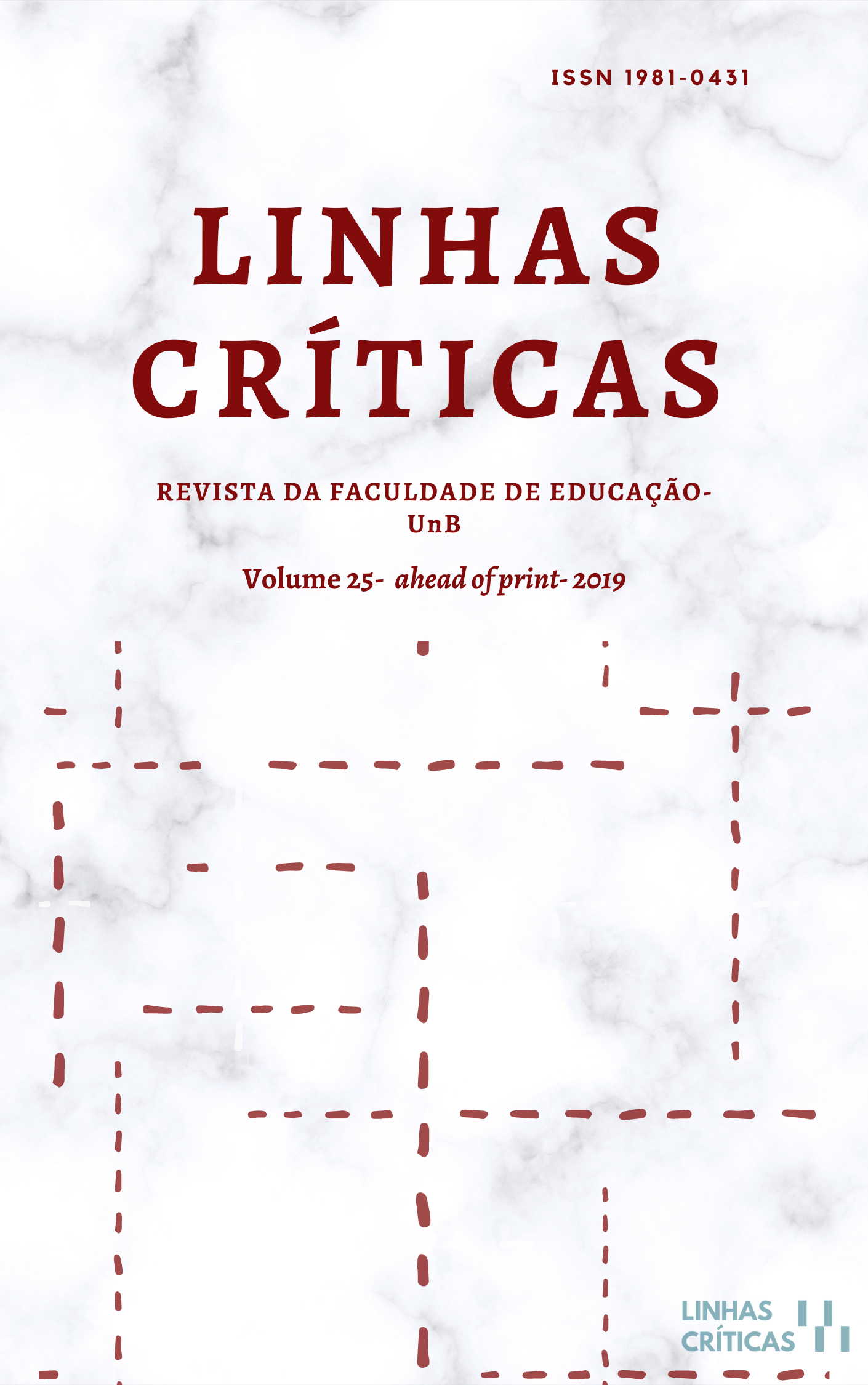MATHEMATICS AND THE INCLUSION OF THE OTHER
DOI:
https://doi.org/10.26512/lc.v25.2019.21854Keywords:
Mathematics, Habermas, Teaching, Social Practice, InclusionAbstract
This text is based on the need to discuss school mathematics, as a social practice, by an inclusive tendency as opposed to a technical and segregationist character that sometimes seems to present itself in classrooms. Pursuing the Habermasian presuppositions of the Theory of Inclusion of the Other, we propose a reflection of this theme, initially, with an introductory item on the exclusionary character of the teaching of school mathematics, presenting, next, the mathematics understood as social practice; the Habermasian thought, ending with the possibility of thinking the teaching of mathematics as Inclusion of the Other.
Downloads
References
Araújo, C. S. (2016). Todos os nomes: Jürgen Habermas e o uso do nome social no estado de Goiás. Fragmentos de Cultura, 26, 93-101.
Durkheim, E. (2004). Da divisão do trabalho social. (E. Brandão, Trad.). São Paulo: Martins Fontes. (Obra oginal publicada em 1893).
Dutchazky, S., & Skliar, C. (2000). La diversidad bajo sospecha. Reflexiones sobre los discursos de Ia diversidad y sus implicancias educativas. Cuaderno de Pedagogía, 4 (7), 33-54.
Fernandes, P. (2011). O currículo do Ensino Básico em Portugal: políticas, perspectivas e desafios. Porto: Porto Editora.
Freire, P. (2011). Pedagogia do oprimido. 50. ed. São Paulo, SP: Paz e Terra.
Freitas, C. N., & Coura, A. C. (2014). A teoria habermasiana de inclusão do outro e a internação compulsória. In: J. A. de Oliveira Jr., R. Tramontina & A. L. C. Santos (Orgs). Filosofia do direito I. Florianópolis: CONPEDI, 432-446.
Gilli Martins, J. C. (2005). Sobre revoluções científicas na Matemática. Tese de doutorado, UNESP- Instituto de Geociências e Ciências Exatas, Rio Claro, São Paulo, Brasil.
Habermas, J. (1987). Teoría y praxis: estudios de filosofía social. Madrid: Tecnos.
Habermas, J. (1988). Teoria de la acción comunicativa: racionalidad de laacción y racionalización social. Madri: Taurus, 1988.
Habermas, J. (1989). Consciência moral e agir comunicativo. Rio de Janeiro: Tempo Brasileiro.
Habermas, J. (1991). Comentários à ética do discurso. Lisboa: Instituto Piaget.
Habermas, J. (1997). Direito e Democracia: entre facticidade e validade. Rio de Janeiro: Tempo Brasileiro.
Habermas, J. (2002). A inclusão do outro: estudos de teoria política. São Paulo: Loyola.
Habermas, J. (2005). Facticidad y validez: sobre el derecho y el Estado democrático de derecho en términos de teoría del discurso. 4a ed. Madrid: Trotta.
Habermas, J. (2009). Técnica e ciência como “ideologia”. Lisboa: Edições 70.
Lave, J., & Wenger, E. (1991). Situated learning: legitimate peripheral participation. Cambridge: Cambridge University Press.
Matos, J. F. L. (1999). Aprendizagem e prática social. Educação Matemática em Portugal, Espanha e Itália. Actas da Escola de Verão–1999, 65 – 92.
Miguel, A., Garnica, A. V. M., Igliori, S. B. C., & D’ambrosio, U. (2004). A educação matemática: breve histórico, ações implementadas e questões sobre sua disciplinarização. Revista Brasileira de Educação, 27, 70-93.
Peralta, D. A. (2012). Formação continuada de professores de matemática em contexto de reforma curricular: contribuições da Teoria da Ação Comunicativa. Tese de doutorado, UNESP- Faculdade de Ciências, Bauru, São Paulo, Brasil.
Santos Fernandes, F. A. (2016). Educação Matemática Muda. Boletim de Educação Matemática, 30(55), 308 – 324.
Secretaria da Educação do Estado de São Paulo. (2009). Matrizes de referência para a avaliação SARESP: documento básico/Secretaria da Educação; coordenação geral, Maria Inês Fini. – São Paulo: SEE, 2009.
Secretaria da Educação do Estado de São Paulo. (2017). Resultados de Matemática. SARESP em Revista, 1. http://saresp.vunesp.com.br/resultadosgeralmat.html
Sena, I. J. (2015). Queixa escolar e adolescência: sentidos construídos em contexto de vulnerabilidade social em Camaçari-Bahia. Dissertação (Mestrado em Psicologia). UFBA - Instituto de Psicologia. Salvador.
Skovsmose, O. (2007). Educação Crítica: Incerteza, Matemática, Responsabilidade. Tradução de Maria Aparecida Viggiani Bicudo. São Paulo, SP: Editora Cortez.
Viola Dos Santos, J. R. (2012). Legitimidades possíveis para a formação matemática de professores de matemática (ou: assim falaram Zaratustras: uma tese para todos e para ninguém). Tese de doutorado, UNESP - Instituto de Geociências e Ciências Exatas, Rio Claro, São Paulo, Brasil.
Published
How to Cite
Issue
Section
License
Copyright (c) 2019 Linhas Críticas

This work is licensed under a Creative Commons Attribution 4.0 International License.
Authors who publish in this journal agree to the following terms:
-Authors maintains the copyright and grants the journal the right of first publication, the work being simultaneously licensed under the Creative Commons Attribution License which allows the sharing of the work with recognition of the authorship of the work and initial publication in this journal.
- Authors are authorized to enter into additional contracts separately, for non-exclusive distribution of the version of the work published in this journal (eg publish in institutional repository or as a book chapter), with acknowledgment of authorship and initial publication in this journal.
-Authorers are allowed and encouraged to publish and distribute their work online (eg in institutional repositories or on their personal page) at any point before or during the editorial process, as this can generate productive changes as well as increase the impact and the citation of published work (See The Effect of Free Access).



